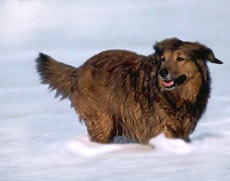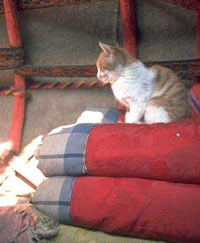Holiday and winter pet hazards

Winter is brutal and we want everyone, especially dog owners to keep in mind the ice hazard lingering beneath the snowy patches. It is easy to misjudge, especially on slopes and dogs can be particularly vulnerable to hip/knee dislocations.
Dog paws are also subject to frostbite quickly. Salt, chemical de-icers and even cinders can cause a variety of problems so be sure to visually inspect paw pads after winter walks.
Our friends with cats may want to make sure there is plenty of fresh water to drink and a warm place for them to curl up. Radical temperature changes and prolonged cold may spark urinary crystals to form in the urethra and /or cause bladder problems. If you see your feline straining to urinate without success or urinating in inappropriate places it may be early signs of an infection. In male cats, a blockage can happen very quickly and symptoms of this nature require you to act fast.
Observe your pet and call your vet.
Blockages advance quickly. Within 24 hours of the onset a cat can suffer permanent renal damage or die. 
The cold also brings our pets in close proximity to dangers present in our everyday lifestyles, so make sure to "pet-proof" your home. Many ordinary items such as cocoa, flowers/house plants, cosmetics, and coffee are typical to the post holiday arsenal of pet poisons. Holiday activities may cause these items to be even more abundant. In addition, prescription medication should never be left out, even if in the best child-proof bottles.
Animal companions and pets aren't at risk of getting our colds and flu. However, they do react to any airborne contaminants like mold, carbon monoxide, or chemical vapors. Birds are especially vulnerable and care should be taken to ensure they are in a well-ventilated environment and never directly exposed to petroleum/pesticide vapors.
Make sure your family knows which items shouldn't be left available to your pets. It is a good idea to recognize and learn the symptoms and appropriate action needed in case of poisoning. Milk of Magnesia and/or activated charcoal should be available in every first-aid kit.
In a pinch, common table salt mixed with water to poultice consistency can be applied to the back of the pet's tongue to induce vomiting in emergencies. Household poisoning is the leading preventable cause of pet emergencies.
Learn more by visiting:
|